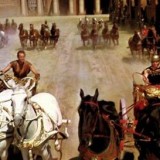The Roman empire faced an unexpected internal problem as it reached the peak of its power and wealth in the second century CE. Plunder and tribute filled its coffers, widening the gulf between rich and poor. Meanwhile, cheap slave labour was powering farms and mines, together with the construction of buildings, bridges, aqueducts and roads. Many Roman citizens were left unemployed, bored, hungry and restless. This was a politically dangerous situation.
So in 140 CE, the Caesars began creating make-work projects and distributing free grain. Over the next two centuries, writes Alice Schroeder in The Danger of Living on Bread and Circuses (Bloomberg.com, June 1/11), subsequent “emperors added holidays until, eventually, the Romans spent half their days attending gladiator games, public executions and chariot races. Disgusted, the satirist Juvenal accused his fellow citizens of selling out for bribes of ‘bread and circuses’ [panem et circenses]“.
This strategy of appeasing and distracting was successful in Rome – at least until 410 CE when the Visigoths sacked the city. And the strategy has been used elsewhere in history with limited success: in Spain with “bread and bullfights”, in Russia with “bread and spectacles” and today with “bread and games”. The “bread” of history, Schroeder reminds us, has been replaced with fast food restaurants, big box stores and warehouse wholesale clubs. The “games” have multiplied. Professional sports now occupies huge amounts of the public’s attention: football, hockey, baseball, basketball, golf, tennis, cycling – anything competitive that can entertain by arousing tribal loyalty and passion.
The electronic and digital ages have simply magnified this trend. “When entertainment dominates a society, it changes more than the culture; it also reshapes the economy,” Schroeder notes. “You can see that circuses are where the money is from the rise of digital entertainment, which has steered enormous amounts of discretionary income toward digital content and the devices that run it: laptops, televisions, gaming consoles, smart phones.” The problem, she suggests, is that this circus atmosphere shifts labour and energy from production to service, weakening the foundational economic structure of cultures.
Entertainment also reshapes the character of cultures, increasing their internal political vulnerability by drawing attention from important social and environmental issues to wholly manufactured and artificial distractions – the well-being of society is rarely improved when the public gets exercised by one team defeating another on a playing field or a hockey rink. But valuable attention and energy are diverted from matters that are important.
The “circuses” that presently distract from the important work of society are not a contrived and co-ordinated effort by the entertainment industry and corporations working in collusion with government. The professional sports industry makes money. The sponsoring corporations advertise and profit. The politicians have fewer people pestering them about matters of governance. The process is more inadvertent than engineered; it simply persists because it suits the interests of the few and it entertains the many. So it becomes a cultural habit that is deemed to be normal. The Olympics are only special because of their infrequency and the marketing acumen that promotes them.
The spectacular “circus” of the Olympics is so blatantly elaborate, extravagant and expensive that it should be its own worst advertising. The costs are staggering. Montreal spent 30 year paying off its $1.5 billion debt for hosting the 1976 games. The financial burden is a factor in Greece’s present financial crisis. The 2012 London Olympics are a similar exercise in outrageous superlatives, with overall costs expected to be $17 billion.
London’s security costs alone are approaching $1 billion. This will include, as a sample, 24,000 to 49,000 security personnel (the total, of course, is a secret), a helicopter gun-ship carrier on the Thames, a surface-to-air missile system in the city, 1,000 armed diplomatic and FBI agents, 55 dog teams, and an 18 km electric fence of 5,000 volts costing $125 million. The cost of protecting each of the 17,000 athletes for the 17 days of the London Olympics will be $92,500. This, however, is a bargain compared to the $15 billion Greece spent on the 2004 Athens Olympics, at a security cost of $140,000 per athlete. Fortunately, Beijing could afford its security costs of $6.5 billion. As The Guardian Weekly (March 30/12) duly concludes, these costs show that the modern Olympics are “society on steroids”.
This profligate spending on the Olympics could be dismissed as merely expensive indulgence if human civilization didn’t have critical structural and environmental challenges that need urgent attention. If societies everywhere could rouse themselves to give as much impassioned energy to the litany of social, economic and ecological problems plaguing the planet as they do to the Olympic gatherings, then our future would look more promising.
If our international environmental gatherings in Kyoto, Stockholm, Cancun and Rio were measured against the standards of the official Olympic games, they would be deemed abject failures, marked by the collapse of nearly all the sprinters within a few metres of the starting line. The comparison would not be so disquieting if we had not done all this before – back in the Roman Empire.


How can London be spending as little as one billion when we spent almost that much on security for the G8/G20 weekend? That must be a secret as well.